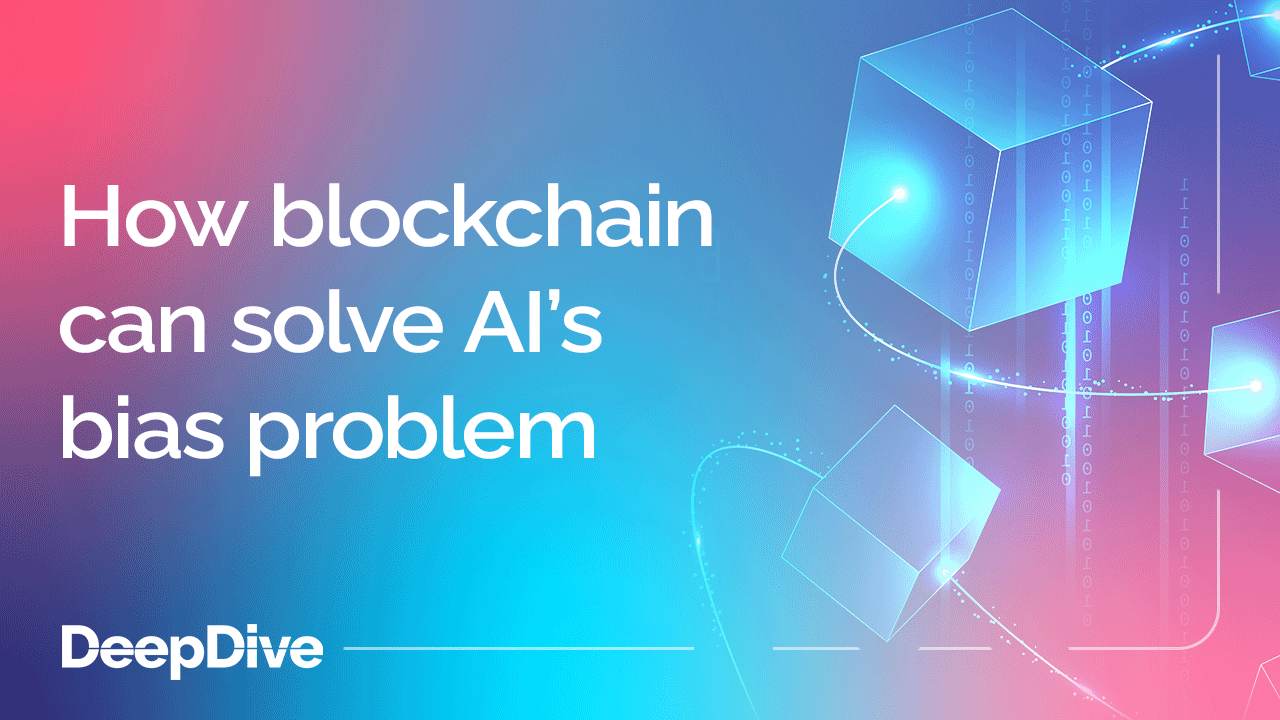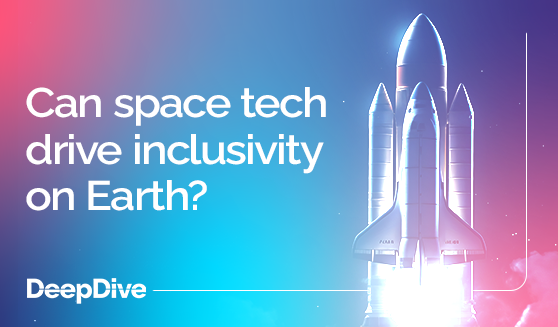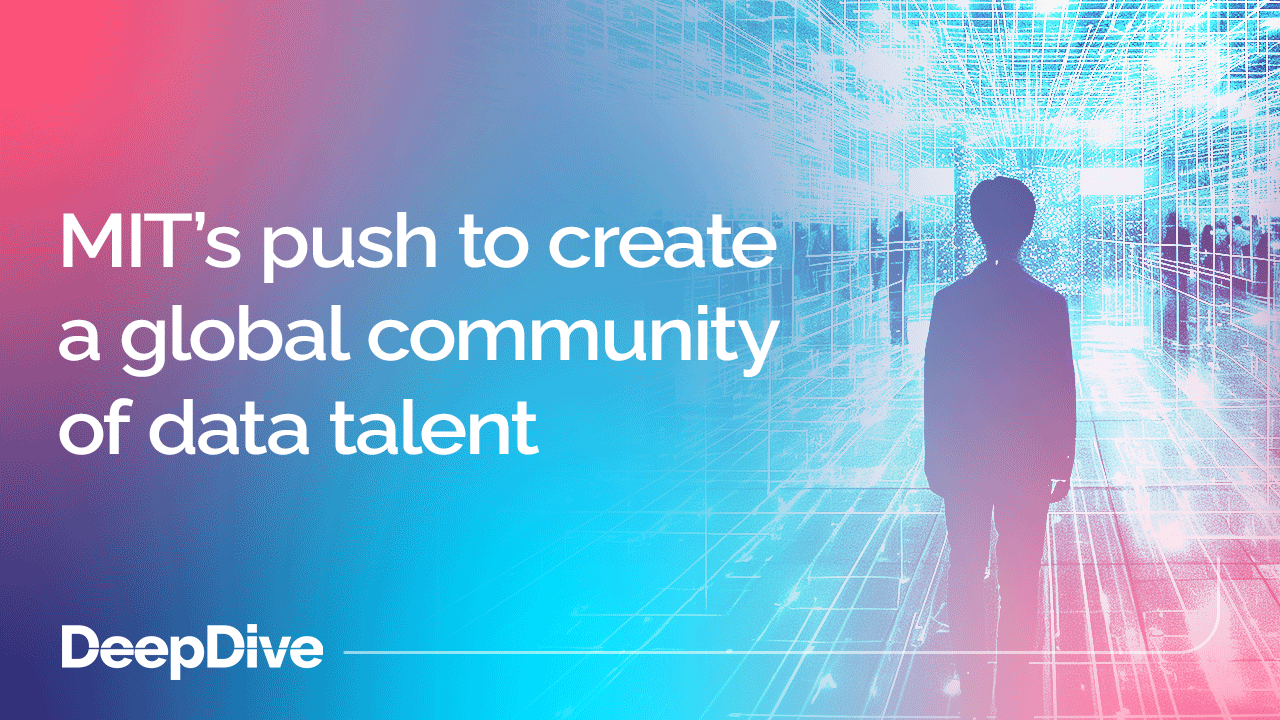

Can space tech drive inclusivity on Earth?

Welcome to the 20 new deep divers who joined us since last Wednesday. If you haven’t already, subscribe and join our community in receiving weekly AI insights, updates, and interviews with industry experts straight to your feed.
DeepDive
Your weekly immersion in AI.
“These deep tech advancements represent not only the future of exploration, but a paradigm shift in how space-derived innovations can contribute to sustainable growth and progress here on Earth.”
In last week’s newsletter, Shelli Brunswick (Chief Operating Officer at Space Foundation) shared her career path so far; from working in the US Air Force, to founding her own company that helps people find their way in the rapidly evolving space industry.
For today, we asked Shelli if advancements in space tech can drive inclusivity and equitable access to resources on Earth, and which emerging technologies are driving the greatest transformation in space.
Here’s what she told us.
How have recent advancements in AI technology influenced both your own work, and developments in the space industry more broadly?
“Recent advancements in AI, quantum technology, and other deep-tech fields have transformed my work and the space industry.
“AI has unlocked unprecedented potential, from autonomous spacecraft to advanced data analysis, while quantum and machine learning technologies are pushing the boundaries even further.
“As a futurist and advocate, I view these technologies as essential to advancing space missions and creating efficiencies. For instance, digital twin technology has revolutionised space mission planning and operations. Digital twins, virtual replicas of physical systems, allow for predictive modelling and optimisation in complex missions. NASA first pioneered digital twins in the 1960s, and today, they’re instrumental for projects like the James Webb Space Telescope, which relies on digital twins to simulate deployment phases, identify potential issues, and refine processes for critical operations.
“Machine learning and quantum technology have introduced new capabilities as well. Quantum computing, though still in its early stages, promises breakthroughs in data processing speeds and encryption. For space applications, quantum technology could lead to faster data processing on spacecraft, real-time mission adaptability, and enhanced security protocols essential for protecting sensitive data from satellites and deep-space probes. Quantum advances can also play a role in materials science, optimising the strength and durability of materials used in spacecraft, which is key for missions that must withstand extreme conditions in space.
“AI-powered autonomous systems have greatly enhanced mission autonomy. NASA's Perseverance Rover, for example, uses AI to navigate Martian terrain autonomously, select rock samples, and avoid obstacles – decisions that it can make independently without constant guidance from Earth.
“Similarly, ESA’s ExoMars mission incorporates AI for real-time terrain analysis, helping it efficiently map its surroundings and increase the success of its mission objectives. Companies like SpaceX have utilised AI in docking technologies, demonstrating how machine learning algorithms provide greater precision and safety, critical for deep-space and human missions.
“In data analysis, quantum computing and machine learning enable the processing of immense datasets, enhancing our exploration capabilities. AI now helps analyse vast amounts of data from observatories like the Hubble and James Webb Space Telescopes, detecting distant celestial bodies and potentially habitable planets. Collaborations between NASA and Google, such as those analysing Kepler mission data with machine learning, have led to discoveries of new exoplanets that might otherwise have gone undetected. These advancements expand our understanding of our place in the universe on a new scale, while quantum algorithms promise to accelerate these discoveries even further.
“Quantum and AI technologies also address critical Earth-based challenges. ESA’s Digital Twin Earth project combines AI with quantum-enhanced satellite data to create detailed, predictive environmental monitoring, disaster response, and resource management models. These models can predict and mitigate climate impacts and provide near-real-time support for natural disasters. AI, deep tech, and quantum advancements in space are reshaping exploration and creating sustainable solutions for life on Earth.
“I've witnessed the transformative impact of these technologies in action. As we look to the future, AI, quantum computing, and machine learning will be integral to pushing space exploration's limits, advancing space-bound technologies, and Earth-based solutions. These deep tech advancements represent not only the future of exploration, but a paradigm shift in how space-derived innovations can contribute to sustainable growth and progress here on Earth.”
Could you share some of the most exciting space innovations you've seen in the last year or two?
“Remarkable advancements in space innovation have marked the past few years, each underscoring the transformative potential of shared space assets, sustainability, and global inclusivity.
“Recently, I had the privilege of moderating a panel at the United Nations General Assembly (UNGA) 79 Science Summit, where we explored how space technology is a powerful tool for sustainable development. This session highlighted the potential of earth imaging satellites, space data, and GIS mapping to revolutionise sectors like agriculture, healthcare, and environmental management by using these technologies to address some of the world’s most pressing challenges.
“Shared space assets have emerged as a particularly exciting area of development, enabling connectivity and bringing people from underserved regions into the digital economy.
“Satellite-based internet and mobile connectivity allow remote areas to access essential services like weather forecasting, which helps farmers make informed agricultural decisions, and disaster response, which saves lives in regions vulnerable to natural hazards.
“Sustainability is another core focus of space innovation, with initiatives promoting responsible practices on Earth and in orbit. The space industry has taken substantial steps toward sustainability through in-orbit servicing, satellite recycling, and developing reusable launch systems. These practices mitigate space debris risks, ensuring space remains accessible for future generations. Satellites monitoring environmental conditions provide essential data on deforestation, greenhouse gases, and ocean health, giving us tools to tackle climate change and other ecological challenges here on Earth. By employing space assets sustainably, we protect our orbital environment and equip ourselves with technologies essential for managing resources on Earth.”
Can space tech drive inclusivity on Earth?
“Yes – space technology fosters a more inclusive world by expanding access to critical resources. By making satellite data widely accessible and transforming it into actionable insights, we empower people in rural and underserved communities to participate in global initiatives. Whether it’s optimising land use for agriculture or improving healthcare access in remote areas, these advancements significantly impact lives.
“Programs like the UN’s Space2030 Agenda and NASA Harvest exemplify this commitment by providing satellite data to support food security, sustainable agriculture, and climate resilience worldwide.
“The global space economy is also unlocking innovation, entrepreneurship, and inclusion opportunities, creating pathways into the technology industry for individuals from diverse backgrounds, regions, and age groups. Through space, we are breaking down barriers that have historically limited access to the tech sector and ensuring that a broad range of perspectives contributes to addressing challenges like returning to the moon, exploring Mars, and solving urgent issues on Earth. Achieving these ambitious goals demands the same principles of collaboration and international partnership for sustainable development, climate action, and disaster resilience.
“Platforms such as LEAP, DeepFest, the World Economic Forum, and the United Nations General Assembly provide vital spaces for finding common ground, developing technological solutions, and fostering collaboration across borders, industries, and communities. Through these shared initiatives, we are building sustainable pathways that empower individuals to engage in space and technology, making the global space economy a model of inclusive, collaborative progress. With space innovation advancing human development and sustainability, we are on the path toward a brighter, more connected, and more resilient future for all.”
What's one thing you wish you'd known much earlier in your career?
“I wish I’d known the importance of a comprehensive, human-centred framework for navigating leadership and personal growth. Over time, I’ve realised how universal principles – like resilience, collaboration, and strategic foresight – are vital in the space industry and across all sectors. This insight became the foundation for my book series, What’s Space Got To Do With It?, which aims to make these lessons accessible to a wider audience.
“This series fills a crucial gap in leadership literature by drawing directly from experiences in the high-stakes world of space innovation and my interactions and interviews with over 200 global thought leaders. Through these conversations, I recognised the need for resources that don’t just tell stories but also provide actionable steps for readers to apply to their own careers, regardless of their field. I wanted to share the insights I wish I’d had – guidance that transcends industries and regions, offering pathways for people from diverse backgrounds to engage meaningfully with technology and innovation.”
Finally, what are you most looking forward to at DeepFest 2025?
“I’m incredibly excited for DeepFest 2025, especially for connecting with global change makers committed to advancing innovation and technology. Events like DeepFest are invaluable because they bring together experts, visionaries, and futurists from around the world, providing a unique space to explore potential pathways for partnerships that can drive meaningful change.
“My focus at DeepFest will be discovering new avenues for collaboration in emerging fields like AI, quantum technology, and the space industry. These partnerships are crucial for developing cutting-edge solutions that foster inclusivity and create pathways into the technology sector for people from diverse backgrounds.
“I look forward to contributing to discussions on building a more interconnected world where collaborative efforts in technology and space can address current and future global challenges.”
Connect with Shelli on LinkedIn, or learn more about her on her website. And of course, join us at DeepFest 2025 to learn directly from Shelli and other leaders in AI and technology.





